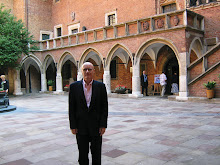Does the Universe Blah Blah Have Meaning?
A colleague of mine died unexpectedly just a few days ago. I’ve been quite flummoxed by the sudden death, especially as she had just moved into the office next to mine. Her death conjures up old and still confusing memories of another colleague who took her life quite a few years ago, and her death was a shock as well. Life always has meaning, we’re conditioned to believe, because human beings say it is so, but in the Sunday Edition of the New York Times (Oct 7, 2007) I read a quite provocative and stimulating two page advertisement that featured 12 scholars and scientists who tried to answer the equally flummoxing question, “Does the Universe Have Purpose?” This is one of those Latin logical arguments, isn’t it? Somewhere in the perfectness of Greek logic, can’t we say, Life has meaning, therefore the Universe has meaning, therefore both were “meant” by something which brought meaning to somebody’s theological mind, right? Maybe not?
Of course life, and the universe has meaning if you have faith, if you want to believe that’s so, if you can’t face the vast meaningless, random events theory that a few scholars offer for faith believers to chew on, but by and large, everybody wants to believe that we have purpose, and so by extension, the Universe must have purpose too, for we are part of the Universe. You can see the logic, yes? You can even add a Creator in there, if you think it will help find meaning.
But so long as humans talk to other humans, humans will tend to say, of course the Universe has meaning. But then a few of the scholars in the advertisement
(www.templeton.org/purpose) offered some challenging perspectives that humans might not want to think about, at least in the context of meaning. Dr. Neil deGrasse Tyson, an astrophysicist and the director of New York City’s Hayden Planetarium, wrote something that smelled a bit funky. After agreeing that religious minded people might want to believe that God has given them purpose, he goes on to write: “But if you’re one of the 100 billion bacteria living and working in a single centimeter of our lower intestine (rivaling by the way, the total number of humans who have ever been born) you would give an entirely different answer. You might instead say that the purpose of human life is to provide you with a dark, but idyllic, anaerobic habitat of fecal matter…” Go to the website for further olfactory details…
Now I’ll admit, as long as humans pontificate ad nauseum about meaning, well, the little bugs in the world (microscopic, and those we sometimes run in panic from) bring on a whole new “context.” What about their meaning? What about their existence? How do they fit into the purpose-thing? Who is their bug God? Don’t they have a say? Of course not, of course not, just the humans get to own “meaning” right?
I know, life is so beautiful, and often, so not, that surely it was “designed.” And, to muddy the waters even more , humans have written that it was so. There, that proves it. But aren’t those deliberations just a poor human’s desire to make meaning out of everything? I’m a bit leary and weary of the pastoral/religious responses I’ve heard over the years, but then I know that’s what they’re supposed to say. Nothing new there. But the human rationale, or argument, for purpose just doesn’t seem convincing, and by the way, I’m a pretty up-beat guy, so it’s not any nihilistic notion that I offer. But when ever I hear anyone espousing the truth about this, it nearly always turns anthropomorphic, and then, I wonder, who’s trying to persuade whom?
Socrates had it right, as he had no faith with the philosophers of the heavens. Instead, he questioned why humans believe what they believe. He often found adults who knew they were right, and then, he began to help those poor Greeks learn that what they knew was just the opinion of someone else. Perhaps that’s all we’ve got. And then there’s The Buddha’s remark, “ I don’t recall saying anything about the (Hindu) gods.” Well, we have much to wonder about, don’t we? Please read the 12 scientists/scholars reflections on line, unless you read the Sunday paper. It’s okay we ask the questions. It’s the insistent answers that bug me sometimes.
This blog provides a brief glimpse of the life of a retired professor of English, with topics ranging from the state of poetry, religion and philosophy, yoga, older athletes and who knows what else might develop. Send a comment if you wish to: clintond@uww.edu
DeWitt Clinton

DeWitt Clinton
About Me

- DeWitt Clinton
- Milwaukee, Wisconsin, United States
- DeWitt Clinton has just finished a long career of teaching and mentoring students at the University of Wisconsin—Whitewater, USA. His essay on travelling in Poland has just appeared in Cultural Studies<=>Critical Methodologies. His newest poetry collection is an adaptation of Kenneth Rexroth’s 100 Poems from the Chinese. A few poems from this manuscript have appeared in Cha, qarrtsiluni, and Verse Wisconsin.